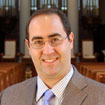Commentary on Jeremiah 31:31-34
Hope for a renewed future is an apropos theme on this fifth Sunday of Lent.
We are in the season of the church where careful reflection and repentance are the call of the hour. In the rhythmic seasons of the church, we are now at the end of a long Lenten journey. We are filled with anticipation for Palm Sunday: the joy elicited from children waving branches because their King is coming. Holy Week is around the corner with the intensity, passion, and hope it brings. Good Friday yields to Holy Saturday which blossoms into Easter morning. “Behold, the days are coming,” says the prophet Jeremiah. Yes, these are the words we need to hear.
From a structural standpoint, it is interesting that Jeremiah 31:31-34, located in what scholars call “The Book of Consolation,” is in itself a word of hope nestled within the surrounding themes of judgment and retribution. Jeremiah is by and large not a “happy” book. There is a reason why he is called the “weeping prophet.” In other words, there are many Lenten themes in the book of Jeremiah: sin, the call to repentance, and the necessity of judgment in the face of broken promises. But as is most often the case with the prophets, though the sting of judgment is real, God does not allow this word to be final. Redemption, salvation, and future hope are.
Jeremiah looks forward here to the coming day of hope. “The days are surely coming,” he says. The unfortunate flip-side to such a claim from Jeremiah is that the days are not here yet. Nevertheless, in this time God will make a new covenant with his people. This is the only time such a collocation appears in the Old Testament, “new covenant.” Though the term itself is novel, the themes associated with it are not, e.g., a renewed heart, first-hand knowledge of God by all, and the forgiveness of sins (cf Joel 2).
The prophet is drawing a sharp contrast with the covenant God made with his people at Sinai: I will be your God and you will be my people. A great deal of covenantal water had flown under the bridge since the Exodus event. The covenantal promises of choosing life or death by attending to God’s solitary claim on them had gone badly in Israel’s life lived in God’s presence. The prophets are all too clear about the matter. Yahweh does not share his marital bed with anyone else. Unfortunately, Israel took to other lovers.
One recalls Yahweh’s insistence that Hosea name his first child: lo’ammi, “not my people.” Yahweh sent Isaiah to speak to “this people,” whereas the comfort promised in Isaiah 40:1 is directed toward “my people”: “Comfort, comfort my people, says your God.” It is in this period of covenantal and relational breakdown between Yahweh and his people that Jeremiah announces this word of future hope. A day is coming in which a new covenant will be established and the failure of the old covenant made at Sinai will be a distant memory.
Why will this happen? How will this happen? These questions are important and straightforward ones flowing from this text. The how question is answered with attention given to the renewal of the heart. The law will not be written on tablets of stone but on the hearts of God’s people. God will affect the heart, writing his instruction, his law, on the heart with his own finger. This writing involves an erasure as well. “The sin of Judah is written with an iron pen; with a diamond point it is engraved on the tablet of their hearts…” says Jeremiah elsewhere (17:1). Where sin was once written, now God’s instruction, God’s own will and desires will be written on that fleshy organ.
This rewriting on the heart leads to the previous question, “Why will this happen?” Again, the text answers the question pointedly. “For I will forgive their iniquity, and remember their sin no more” (31:34b). “For” in English has a causative force to it, though it can often denote a logical or temporal connector. In other words, “For” potentially softens the Hebrew text’s causative emphasis. Why will they know me personally from the least to the greatest? Why will the law be written on their hearts? Because I will forgive their iniquity and remember their sins no more. The syntax of this final verse reveals what makes possible this new order of affairs, this new covenant between Yahweh and his people. This all happens because God is going to forgive their sins.
The Christian connection to this text, especially in this fifth Sunday of Lent, are not difficult to make. It is in the person of Jesus Christ in his atoning work for humanity where forgiveness of sins is to be found and the new covenant is to be enjoyed. Even in the words of institution at the Last Supper, we drink the cup which is the new covenant in his blood. The forgiveness of our sins is what makes possible the renewal of our hearts. Or in sentiments we might find in Paul, we fulfill the law of Christ when our actions correspond to our true humanity that is found in our union with Jesus Christ. Who am I? I am in Christ. My sins have been forgiven. My humanity has been redeemed.

March 25, 2012